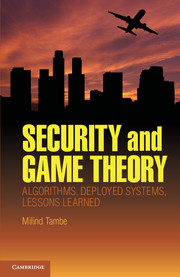Book contents
- Frontmatter
- Contents
- Acknowledgments
- 1 Introduction and Overview of Security Games
- PART I SECURITY EXPERTS' PERSPECTIVES
- PART II DEPLOYED APPLICATIONS
- 4 Deployed ARMOR Protection: The Application of a Game-Theoretic Model for Security at the Los Angeles International Airport
- 5 IRIS – A Tool for Strategic Security Allocation in Transportation Networks
- 6 GUARDS: Game-Theoretic Security Allocation on a National Scale
- PART III EFFICIENT ALGORITHMS FOR MASSIVE SECURITY GAMES
- PART IV FUTURE RESEARCH
- PART V SHORT BIOS
- References
- Index
- References
4 - Deployed ARMOR Protection: The Application of a Game-Theoretic Model for Security at the Los Angeles International Airport
from PART II - DEPLOYED APPLICATIONS
Published online by Cambridge University Press: 05 January 2012
- Frontmatter
- Contents
- Acknowledgments
- 1 Introduction and Overview of Security Games
- PART I SECURITY EXPERTS' PERSPECTIVES
- PART II DEPLOYED APPLICATIONS
- 4 Deployed ARMOR Protection: The Application of a Game-Theoretic Model for Security at the Los Angeles International Airport
- 5 IRIS – A Tool for Strategic Security Allocation in Transportation Networks
- 6 GUARDS: Game-Theoretic Security Allocation on a National Scale
- PART III EFFICIENT ALGORITHMS FOR MASSIVE SECURITY GAMES
- PART IV FUTURE RESEARCH
- PART V SHORT BIOS
- References
- Index
- References
Summary
Introduction
Protecting the national infrastructure, such as airports, historical landmarks, or locations of political or economic importance, is a challenging task for police and security agencies around the world, one that is exacerbated by the threat of terrorism. The protection of important locations includes such tasks as monitoring all entrances or inbound roads and checking inbound traffic. However, limited resources mean that it is typically impossible to provide full security coverage at all times. Furthermore, adversaries can observe security arrangements over time and exploit any predictable patterns to their advantage. Randomizing schedules for patrolling, checking, or monitoring is thus an important tool in the police arsenal to avoid the vulnerability that comes with predictability. Even beyond protecting infrastructure, randomized patrolling is important in tasks varying from security on university campuses to normal police beats to border or maritime security (Billante 2003; Paruchuri et al. 2007; Ruan et al. 2005).
This paper focuses on a deployed software-assistant agent that can aid police or other security agencies in randomizing their security schedules. We face at least three key challenges in building such a software assistant. First, the assistant must provide quality guarantees in randomization by appropriately weighing the costs and benefits of the different options available. For example, if an attack on one part of an infrastructure would cause economic damage while an attack on another could potentially cost human lives, we must weigh the two options differently – giving higher weight (probability) to guarding the latter.
- Type
- Chapter
- Information
- Security and Game TheoryAlgorithms, Deployed Systems, Lessons Learned, pp. 67 - 87Publisher: Cambridge University PressPrint publication year: 2011
References
- 13
- Cited by

